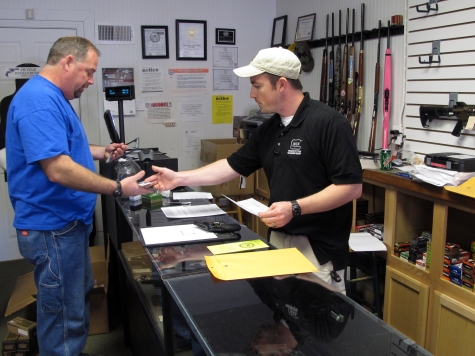
As the push for an “assault weapons” ban loses steam and gun control advocates pool their resources to push for “universal background checks” instead, it’s important to remember something–we already have background checks for gun purchases.
The legislation requiring them was signed into law by Bill Clinton in 1993, thus creating the National Instant Background Check System (NICS).
When a buyer goes into a gun store, Wal-Mart, Dick’s Sporting Goods, Gander Mountain, or even a pawn shop, he or she has to go through NICS to get their gun.
This means they have to fill out a form providing private information, and must answer questions regarding their criminal and mental history, as well as any substance abuse problems.
Such questions include:
1. Are you an unlawful user of or addicted to any controlled substance?
2. Have you ever been adjudicated as mentally defective or committed to a mental institution?
3. Are you under indictment for a crime punishable by imprisonment for a term exceeding one year?
4. Have you been convicted in a court of a misdemeanor crime of domestic violence?
These are only a few of the questions. Others touch on citizenship and probe deeper into criminal history. But one wrong answer and the gun sale is stopped.
Moreover, after the would-be buyer answers all the questions on the form, the licensed gun dealer then places a phone call to the FBI, provides them the Social Security number of the would-be buyer, and the FBI checks a database for criminal activity–especially a felony–associated with the holder of that Social Security number.
If the would-be buyer survives these checks, he or she can purchase the gun.
With all this in place, why would gun control advocates be pushing for “universal background checks”? There is a proximate reason and an ultimate one.
The proximate reason is that the NICS checks only apply to licensed dealer sales. Politicians like Sens. Dianne Feinstein (D-Cal.) and Richard Blumenthal (D-Conn.) want to see background checks performed on every gun sale–even when that sale is really just a transfer of a firearm between a grandfather and his grandson, a mother and her daughter, or a friend and his neighbor.
This is what gun control advocates both in and out of the Senate mean when they keep referencing the deeply “flawed” NICS system. In truth, it’s not flawed at all; it simply doesn’t force grandpas to get checks before they pass their guns to their grandsons.
In fact, the current NICS is so effective that Adam Lanza decided to go around it because he knew he wouldn’t pass it. (He went around it by stealing his guns.)
Ultimately, the push for “universal background checks” is an effort designed to end all private gun sales and gun transfers, and to create a paper trail on every gun in the country. Gun grabbers have estimated that 40% of the guns in America right now were sold pre-1993, and therefore have no paper trail on them. They want to change this.
As David Kopel said before the Sen. Judiciary Committee on Jan. 30, this will necessitate a gun registry if it is to be enforceable. And any student of history knows that gun registration leads to confiscation at some point.
The bottom line: the push for “universal background checks” is not so much about the background checks as it is about expanding government’s knowledge of the precise whereabouts of every gun in the country. Like all gun control, the predominant goal is simply more control.

COMMENTS
Please let us know if you're having issues with commenting.